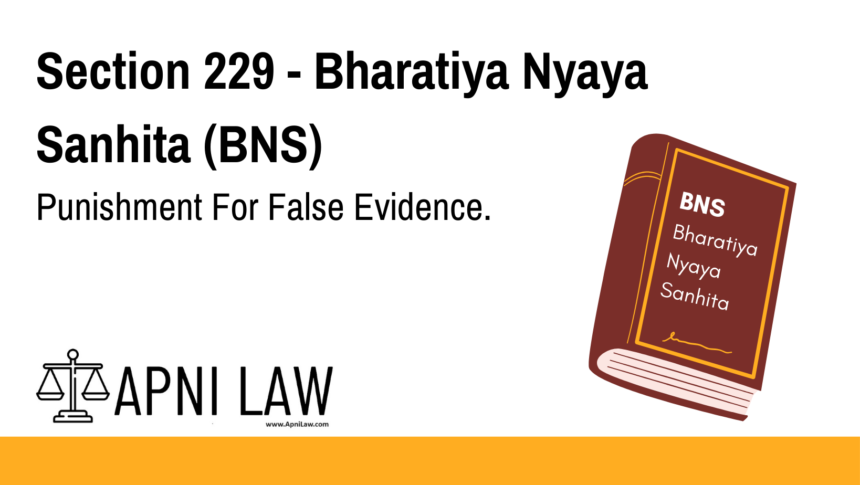Code: Section 229 BNS
(1) Whoever intentionally gives false evidence in any stage of a judicial
proceeding, or fabricates false evidence for the purpose of being used in any stage of a
judicial proceeding, shall be punished with imprisonment of either description for a term
which may extend to seven years, and shall also be liable to fine which may extend to ten
thousand rupees.
(2) Whoever intentionally gives or fabricates false evidence in any case other than
that referred to in sub-section (1), shall be punished with imprisonment of either description
for a term which may extend to three years, and shall also be liable to fine which may
extend to five thousand rupees.
Explanation 1.—A trial before a Court-martial is a judicial proceeding.
Explanation 2.—An investigation directed by law preliminary to a proceeding before
a Court, is a stage of a judicial proceeding, though that investigation may not take place
before a Court.
Illustration.
A, in an enquiry before a Magistrate for the purpose of ascertaining whether Z
ought to be committed for trial, makes on oath a statement which he knows to be false. As
this enquiry is a stage of a judicial proceeding, A has given false evidence.
Explanation 3.—An investigation directed by a Court according to law, and
conducted under the authority of a Court, is a stage of a judicial proceeding, though that
investigation may not take place before a Court.
Illustration.
A, in an enquiry before an officer deputed by a Court to ascertain on the spot the
boundaries of land, makes on oath a statement which he knows to be false. As this
enquiry is a stage of a judicial proceeding, A has given false evidence.
Explanation of Section 229 BNS
Section 229 of the Bharatiya Nyaya Sanhita (BNS) deals with the punishment for giving false evidence (perjury) in judicial proceedings. It ensures the integrity of legal processes by penalizing those who provide or fabricate false evidence.
Key Provisions:
- False Evidence in Judicial Proceedings:
- A person who provides false testimony or submits fabricated evidence at any stage of a judicial process can face imprisonment of up to seven years, along with a fine.
- False Evidence in Cases Involving Serious Punishments:
- If the false evidence is related to a case where the accused faces the death penalty or life imprisonment, the punishment increases to up to ten years of imprisonment, along with a fine.
- Purpose of the Law:
- The provision ensures that courts can rely on truthful testimony and prevents wrongful convictions or acquittals due to perjury.
- Related Provisions:
- Section 230 BNS – Deals with punishment for fabricating false evidence.
- Section 231 BNS – Punishes the use of false evidence.
Illustration
Example 1: False Evidence in a Theft Case
A witness falsely testifies in a theft case, leading to the wrongful conviction of an innocent person. Upon discovery, the witness is prosecuted under Section 229 BNS and may face up to seven years in prison with a fine.
Example 2: False Evidence in a Murder Trial
A person fabricates evidence in a murder trial where the accused faces the death penalty. Since the case involves life imprisonment or death, the fabricator could face up to ten years of imprisonment under Section 229 BNS.
Common Questions and Answers on Section 229 BNS
1. What is the punishment for giving false evidence in court?
- A person providing false evidence can be imprisoned for up to seven years and fined. If the case involves life imprisonment or death, the punishment can extend to ten years.
2. What is the difference between giving and fabricating false evidence?
- Giving false evidence means making false statements under oath.
- Fabricating false evidence means creating misleading documents, records, or objects to deceive the court.
3. Can a person be punished for false evidence given outside a judicial proceeding?
- No, Section 229 BNS applies only to judicial proceedings. However, fabricating false evidence can be covered under other sections.
4. Can false evidence affect the outcome of a trial?
- Yes. If false evidence is used, it can lead to wrongful convictions or false acquittals, which is why strict punishment exists under Section 229 BNS.
5. Can a person retract false evidence to avoid punishment?
- If a person realizes they have given false evidence, they should inform the court immediately. However, retraction does not guarantee that punishment will be avoided.
Conclusion
Section 229 BNS plays a crucial role in maintaining the fairness and reliability of judicial proceedings. By imposing strict penalties on individuals who provide or fabricate false evidence, the law helps in preventing wrongful convictions and ensuring justice is upheld.
For more legal insights, visit ApniLaw today! 🚀








